
Sleep
Short sleepers - those who regularly get five or fewer hours of sleep at night - may be at a higher risk of developing depression symptoms, according to a study published Thursday.
Researchers examined the health data of 7,146 individuals, age 50 and older in England, and found that older adults who sleep five or fewer hours a night - either because of a genetic predisposition or other reasons - were more likely to show signs of depression years later. The researchers followed the study participants for an average of eight years.
The findings
¦ Compared with people who sleep seven hours a night, older adults who reported five or fewer hours on average were 2.5 times more likely to develop symptoms of depression later in life. Those who were genetically predisposed to short sleep were 14 percent more likely to develop symptoms of depression years later in life.
¦ Too much sleep was a problem, too. Older adults who reported sleeping more than nine hours of sleep were 1.5 times more likely to develop symptoms of depression later in life, as compared with those who slept an average of seven hours.
¦ Depression also was more likely to lead to worse sleep. People with symptoms of depression were approximately 33 per cent more likely to sleep for five or fewer hours a night.
The study, based on data from the English Longitudinal Study of Ageing, found an association and not a causation between shorter sleep and symptoms of depression, said Odessa Hamilton, the lead author of the study and a doctoral researcher in biobehavioral epidemiology and precision medicine at the University College London. The study was published in Translational Psychiatry.
Background
Sleeping for too many or too few hours at night has been seen as a sign of depression, Hamilton said. And some studies show that depression is often associated with problems sleeping.
But, more recently, researchers have started to consider whether a lack of sleep could be the cause of depression and other mental health issues.
Hamilton said the researchers wanted to study genetic data to "unravel" what comes first.
"The more we know about our individual genetic signatures, the more we're likely to be able to take preventive steps to disease broadly," she said.
Researchers have identified genes that are associated with short sleep and that allow individuals to not suffer from the effects of sleep deprivation. But there are no definitive numbers on how many people in the world have these genes, researchers said.
Hamilton said they used polygenic scores to identify individuals with a genetic predisposition for less sleep based on genome-wide association studies.
The study focused only on participants of European ancestry, which is a limitation, Hamilton said. The results may not be generalizable to people of other races and ethnicities.
What experts are saying
Older adults can find it difficult to sleep through the night, with or without health problems. And it's harder for them to fall asleep once they're awake, said Satchin Panda, a professor at the Salk Institute for Biological Sciences and the author of "The Circadian Code," a book on the importance of maintaining your circadian rhythm. It may be because older adults have less deep sleep, so small disturbances can wake them up.
It's not that older adults require fewer hours of sleep. Instead, they actually don't "rebound" as well from a night without as much sleep, Panda said.
"We may not feel sleepy, just like teenagers do on the weekend, but we still have to make an effort to sleep enough," he said.
Some people do sleep less and feel fine, they're not tired or irritable throughout the day, Panda said. And that may be, at least in part, because of genetics.
But no one gene can cause someone's sleep problems, he said. And healthy sleeping habits can reduce the risk of diseases associated with poor sleep, such as depression.
"If you're given a lemon, you have to make lemonade," he said. "The good habits can lessen the bad effect of bad genes."
.jpg)
Qatar Secures Place Among the World's Top 10 Wealthiest Nations
.jpg)
Hamad International Airport Witnesses Record Increase in Passenger Traffic

Saudi Arabia: Any visa holder can now perform Umrah

What are Qatar's Labour Laws on Annual Leave?
Leave a comment